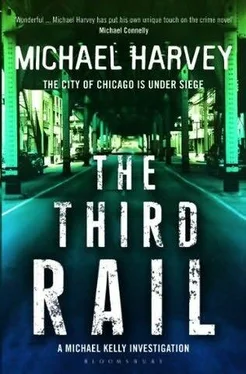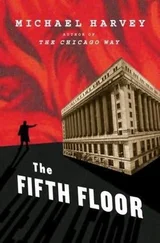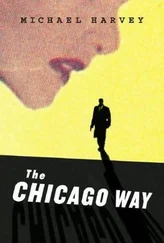Michael Harvey - The Third Rail
Здесь есть возможность читать онлайн «Michael Harvey - The Third Rail» весь текст электронной книги совершенно бесплатно (целиком полную версию без сокращений). В некоторых случаях можно слушать аудио, скачать через торрент в формате fb2 и присутствует краткое содержание. Жанр: Полицейский детектив, на английском языке. Описание произведения, (предисловие) а так же отзывы посетителей доступны на портале библиотеки ЛибКат.
- Название:The Third Rail
- Автор:
- Жанр:
- Год:неизвестен
- ISBN:нет данных
- Рейтинг книги:3 / 5. Голосов: 1
-
Избранное:Добавить в избранное
- Отзывы:
-
Ваша оценка:
- 60
- 1
- 2
- 3
- 4
- 5
The Third Rail: краткое содержание, описание и аннотация
Предлагаем к чтению аннотацию, описание, краткое содержание или предисловие (зависит от того, что написал сам автор книги «The Third Rail»). Если вы не нашли необходимую информацию о книге — напишите в комментариях, мы постараемся отыскать её.
The Third Rail — читать онлайн бесплатно полную книгу (весь текст) целиком
Ниже представлен текст книги, разбитый по страницам. Система сохранения места последней прочитанной страницы, позволяет с удобством читать онлайн бесплатно книгу «The Third Rail», без необходимости каждый раз заново искать на чём Вы остановились. Поставьте закладку, и сможете в любой момент перейти на страницу, на которой закончили чтение.
Интервал:
Закладка:
It was 9:45 when Nelson sent his text message. Robles checked it and turned the phone off. The morning rush along Lake Shore Drive was stil in ful throat, a solid line of cars creeping south at twenty miles an hour. Robles had moved forward a bit so he was under the overhang of a tree and scanned the line of cars with the zoom lens of his Nikon. Then he pul ed out a smal set of binoculars and gave the road a second look. Robles didn’t know exactly what he was searching for: a face, a gesture, a moment, something that would tel him who lived and who died. At 9:51 he stowed the camera back in his duffel and pul ed out a rifle with a scope. He was used to the weapon now and it felt good in his hands. Using the trees as cover, Robles ran over the rifle quickly. He had checked it before he left, but wanted to make sure. Then he loaded it and leaned it against a tree. From his bag, the shooter pul ed out a folding bipod and set it up with a clear view of the Drive. He threw a smal bean bag behind the bipod, dropped to the ground, and lay there for a minute or more, using his binoculars to review the sight lines a final time. At 9:55 Robles put his binoculars away and crawled back to where he’d left the rifle. He slung it over his shoulder and moved forward again to the shooting stand. Gently, he lifted the weapon onto the bipod and seated the rifle butt in the bean bag. The morning sun was glancing off the lake, partial y blinding the drivers headed south and providing even more cover. Stil, Nelson wanted no more than a minute’s worth of shooting time. Robles let out a slow, even breath and eased his eye to the scope.
The first face he saw was that of Jessica Morgan, twenty-three years old and driving a Ford Focus. Jessica was a single mom, working as a paralegal at a Loop law firm and taking classes at night to earn her col ege degree. Jessica would never know about the law degree she’d have earned from the University of Chicago, her subsequent clerkship with a federal judge, and, eventual y, her own seat on the Il inois Supreme Court. Instead, Jessica smiled in Robles’ scope and pul ed an invisible strand of hair back from her face. Then she got an education in execution. The round shattered her windshield, hit her steering wheel, and struck Jessica just under the chin, kil ing her instantly. Robles, however, never saw the fruits of his handiwork. The clock was running, and his rifle was searching.
Peter Rubenstein was two cars away, driving an almost new Cadil ac Sevil e. Peter was sixty-three years old and a widower. His wife, Marcy, had died a year and a half earlier when she fel down a flight of stairs in their home. Rubenstein wept at her funeral and sold their house within three months of putting “his Marcy” in the ground. Now he lived in a high-rise condo along the lake, courtesy of his dead wife’s insurance cash. Peter was whistling and enjoying a view of the morning sun shimmering off the water. He’d never know his insurance settlement had been flagged by state investigators. Never know about the order to exhume Marcy’s body and the subsequent report that would have established her death as a homicide, the result of several blows to the head “inconsistent with a fal down the stairs.” He’d never get to hear the charge of murder laid against his name or feel the cuffs as they slipped across his wrists. He’d never get to know any of that, but he would get to see “his Marcy” sooner than he expected. Robles’ second round hit Rubenstein in mid-whistle, just below the left eye, tearing off most of his head and making life miserable for the undertaker when Rubenstein’s family insisted on an open casket.
Robles’ third shot missed everything. His fourth punched through the chest and burst the heart of forty-seven-year-old Mitchel Case, a second-rate accountant who would never find out about the first-rate affair his wife was having, not to mention the malignant tumor percolating inside his skul. Case’s Corol a was traveling at twenty-eight miles an hour when he was struck. The car hit the divider, jumped it, and plowed into a van headed north. That driver, eighteen-year-old Malcolm Anderson, would never meet his daughter, Janine, because she’d never be born. The only passenger in the van, thirteen-year-old Randal Blake, would have his left leg crushed in the wreckage, undergo four hours of emergency surgery at Northwestern Memorial, and survive. Randal would consider himself one of the lucky ones from that day on the Drive. He’d never know about his four years as an Al — American guard at the University of Michigan or the Hal of Fame career he would have enjoyed with his hometown Bul s. Never know about the
$113 mil ion he’d have earned, the wife he’d have married and grown old with, or the five girls he’d have watched raise families of their own. Instead, Randal would walk for the rest of his life with a limp and a cane. He’d die alone, at the age of forty-six, from complications due to hepatitis C, the disease of a junkie, which is exactly what Randal would become.
Three cars behind Mitchel Case’s car, Robles’ final round creased the roof of a black 2009 Audi and caromed away harmlessly. Inside, the driver took no notice of the metal ic ping, not with the horror show unfolding in slow motion around her. Rachel Swenson locked her brakes and heard the crunch as she hit the car in front of her. A half beat later, she felt another car plow into her from behind. At the same time her air bag deployed, knocking her sil y and preventing her from being impaled on the steering wheel. Rachel put her hand to her face and slipped the rearview mirror over. There was a cut on her forehead, and she felt a little dizzy, but she was alive and stil conscious. A car had jackknifed over the divider and a young black boy was halfway out of a van and moaning. She leaned her shoulder against the driver’s-side door and popped it open. Then Rachel was up and out of the car. There was a smel of raw gasoline in the air. A few feet away, a man was screaming that he had cal ed the police. Rachel could already hear the sirens. She walked down the line of wrecked cars. In one she could see a man with most of his head missing and a young woman crouched nearby, vomiting. Rachel hadn’t spent time at a lot of crime scenes, but she’d seen enough to know the injury she was looking at was not the result of any car accident. The black boy near the van moaned again. Rachel climbed the divider and picked her way around the wreckage. She’d do what she could. As she walked, she felt her cel phone in her pocket. She pul ed it out, dialed, and waited for the other end to pick up. That was when she saw the lone figure, across three lanes of highway, packing up a duffel bag and disappearing into a stand of trees.
CHAPTER 25
Rodriguez hit the intersection of Belmont and Racine at fifty miles an hour and climbing. He had his lights and siren on and was typing into a computer built into a console between us. I had just hung up with Rachel and was scribbling down everything she’d told me. Rodriguez finished with his notes and looked over.
“What do you got?”
“She said he was dressed in a dark-colored jacket and maybe jogging pants. Holed up on a little rise of grass, just west of the Drive.”
Rodriguez was at sixty now, moving east on Belmont.
“And she thinks he’s the guy?”
“She says he was packing a black duffel and running.”
“Hold on.”
Rodriguez typed a few more lines into his computer. Then he came back to me.
“You al right with this?” he said.
Rachel told me she was okay. She sounded okay. And she let me talk to one of the people on the road with her who assured me she was more than okay. So I let her tel me about the man on the hil. Let her talk me into going after him.
“I’m fine. What are we doing?”
Читать дальшеИнтервал:
Закладка:
Похожие книги на «The Third Rail»
Представляем Вашему вниманию похожие книги на «The Third Rail» списком для выбора. Мы отобрали схожую по названию и смыслу литературу в надежде предоставить читателям больше вариантов отыскать новые, интересные, ещё непрочитанные произведения.
Обсуждение, отзывы о книге «The Third Rail» и просто собственные мнения читателей. Оставьте ваши комментарии, напишите, что Вы думаете о произведении, его смысле или главных героях. Укажите что конкретно понравилось, а что нет, и почему Вы так считаете.












